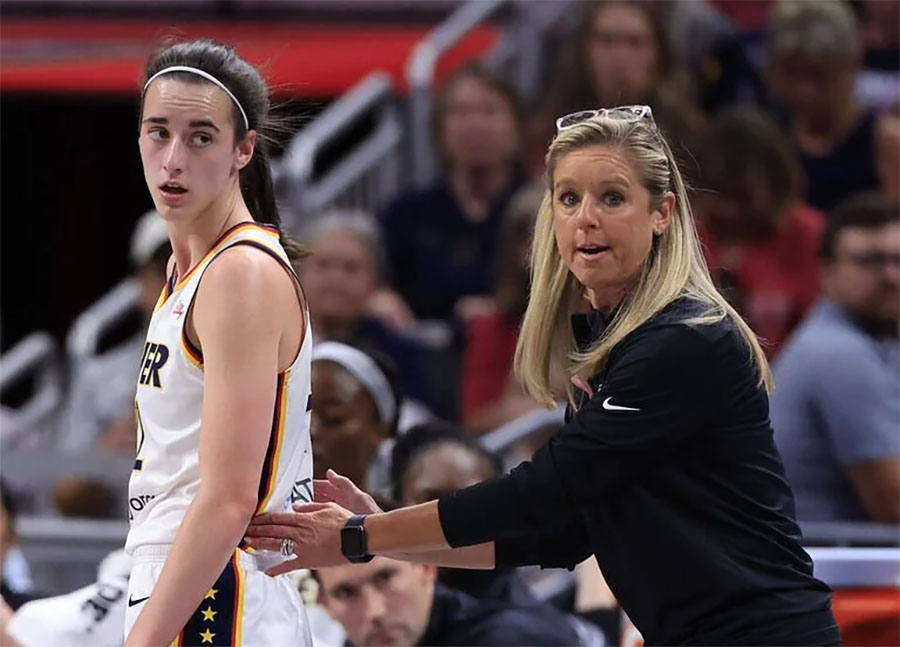
Photo Credit: Getty Images
On Sunday, the Indiana Fever parted ways with head coach Christie Sides, making them the sixth of twelve WNBA teams from the 2024 season without a head coach. This change is part of a swift and high-profile period for the WNBA, which has received unprecedented attention this year.
Sides led the Fever to a 20-20 season, securing their first playoff appearance since 2016, propelled by stars Caitlin Clark and Aliyah Boston, both former Rookie of the Year recipients. Now, with Kelly Krauskopf resuming her role as Fever president and Amber Cox stepping in as general manager, the organization seeks new leadership. After two seasons, Sides will be succeeded by a new head coach.
This move continues a series of coaching shifts following Curt Miller's dismissal by the Los Angeles Sparks on Sept. 24. Just days later, Teresa Weatherspoon was released by the Chicago Sky, Tanisha Wright was let go by the Atlanta Dream on Oct. 2, and the Dallas Wings parted ways with Latricia Trammell on Oct. 18. Most recently, the Washington Mystics dismissed coach Eric Thibault and general manager Mike Thibault on Oct. 23.
Of the four teams absent from the playoffs, all will be looking to fill head coaching positions ahead of the Nov. 17 draft lottery. According to the Elias Sports Bureau, six teams will have new head coaches when the 2025 season opens—the most since the league's inception. This wave of change doesn't include the expansion Golden State Valkyries, who appointed Natalie Nakase as their first head coach on Oct. 10.
With a vibrant coaching carousel underway, questions arise about whether current or recently released WNBA coaches will step into these roles. ESPN analysts Alexa Philippou, Kevin Pelton, and Michael Voepel examine this dynamic period for the league.
The Fever had a rocky start to their season, beginning with a 2-9 record. But Sides successfully guided the team to a playoff berth for the first time in nearly a decade. The team hit its stride after the Olympic break, producing the league's top offense in the latter half of the season. Lin Dunn, the former general manager who transitioned to a senior advisory role, stated in September that the team was progressing as planned within her three-year rebuild vision.
Sides' departure likely reflects a strategic shift, aiming to maximize the talents of Clark, Boston, and potentially Kelsey Mitchell if she re-signs, possibly under a more seasoned coach. Krauskopf's return, along with Cox's addition as general manager, suggests a restructuring within the Fever's leadership.
The 2024 season saw the Fever experience a media frenzy unprecedented in WNBA history, with fans scrutinizing nearly every coaching decision. Nevertheless, Sides and her team kept their focus on the court, improving after an intense early schedule that included 11 games in the season's first 20 days against powerhouse teams like New York and Connecticut.
Considering the team's progress from when Sides took over in 2023 to now, she effectively accomplished her role. She played a pivotal part in helping secure players like Clark and Boston, contributing to the team's promising future while demonstrating resilience in the face of criticism.
The expectations for the next Fever head coach are considerable. The team excelled in fast-paced play, where Clark thrives. She and Boston developed strong pick-and-roll synergy, with the team's improved defense further boosting their wins. Clark aims to reduce turnovers in the upcoming season, building on an impressive rookie year.
Historically, many players with Clark's potential have excelled under their second WNBA head coach. Among the six No. 1 draft picks who won MVP—Lauren Jackson, Maya Moore, Nneka Ogwumike, Candace Parker, Breanna Stewart, and Diana Taurasi—four won their first championships with a second head coach. Notably, Moore and Parker's first title wins came under different circumstances, with Moore's Minnesota Lynx winning during her rookie season and Parker achieving success under her fourth coach.
A parallel to Indiana's current coaching change could be seen in Jackson and Sue Bird's careers, who were drafted consecutively by the Seattle Storm. Although Seattle had a competent coach in Dunn, they made a leadership change after Bird's rookie season and Jackson's second. Hiring Anne Donovan brought championship success to the Storm just two years later, when Bird and Jackson were both 23.
For the Fever, the stakes are high with this hire, especially given the potential of Clark and Boston. Indiana aims to avoid the pitfalls that plagued Parker's early years with the Los Angeles Sparks, who went through multiple coaching changes before finding stability with Brian Agler, eventually leading Parker to her first title at 30.
















